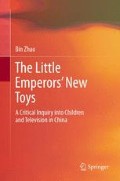Abstract
Parental control over viewing has long been a central focus in studies of the relation between children’s television activities and their intellectual and moral development. Consequently, I have chosen to examine it in detail, in order to show that its dynamics cannot be fully understood apart from an analysis of the social and historical contexts in which parent-child relations are embedded. This is true generally, but it is particularly so in contemporary China where the established terms of these relations are in the process of being eroded and transformed rapidly under the impact of rapid and dramatic economic, social and cultural changes.
Access this chapter
Tax calculation will be finalised at checkout
Purchases are for personal use only
Notes
- 1.
See X.Z. He (1988) for more detailed account and critique of Xiao Jin and Twenty-four Stories of Filial Piety.
References
Bauchard, P. 1952. Child audience: A report on press, film, and radio for children. Paris: UNSECO.
Beurdeley, M. 1969. Chinese erotic art. Paris: Chartwell Books Inc.
Brown, R., and O. Linné. 1976. The family as a mediation of television’s effects. In Children and television, ed. R. Brown. London: Collier Macmillan.
Bryce, J.W., and H.J. Leitcher. 1983. The family and television: Forms of mediation. Journal of Family Issues 4(2): 309–328.
Davis, D.K., and R. Abelman. 1983. Families and television: An application of frame analysis theory. Journal of Family Issues 4(2): 385–404.
Greenberg, B. S., Li, H. R., Wang, J. G., and Ku, L. L. 1989. Young people and their orientation to the mass media: An International Study, Study#3: China, unpublished material kept in the Department of Journalism, The People’s University of China, Beijing.
Gunter, B., and J.L. McAleer. 1990. Children and television: The one eyed monster? London: Routledge.
Haining, P. (ed.). 1975. The penny dreadful: Or, strange, horrid and sensational tales. London: Victor Gollancz Ltd.
He, X. Z. 1988. Lishi Toujing xia de Hunling: Zhongguo Chuantong Wenhua Zhong de Renxing Jiegou Lun (Souls perceived from a historical perspective: On the structure of personality in traditional Chinese culture), Beijing: Guoji Wenhua Chuban Gongsi (International Cultural Publications Ltd.).
Himmelweit, H.T., A.N. Oppenheim, and P. Vince. 1958. Television and the child: An empirical study of the effects of television on the youth. London: Oxford University Press.
Jenks, C. 1982. The sociology of childhood: Essential readings. London: Batsford Academic and Educational Ltd.
Lull, J. 1982. How families choose television programs: A mass observation approach. Journal of Broadcasting 26: 801–811.
Lull, J., and S.W. Sun. 1988. Agent of modernization: Television and urban Chinese families. In World families watch television, ed. J. Lull. Newbury Park: Sage Publications.
McLeod, J., Atkin, C. K., and Chaffee, S. 1972. Adolescents, parents and television use: Adolescent self report measures from a Maryland and Wisconsin sample. In Television and social behavior, eds. G. A. Comstock, and E. A. Rubinstein, Vol. 3, Television and adolescent aggressiveness, Washington, DC: Government Printing Office.
Mills, C.W. 1959. The sociological imagination. Harmondsworth: Penguin.
Mohr, P.J. 1972. Parental guidance of children’s viewing of evening television programs. Journal of Broadcasting 23(2): 213–228.
Schramm, W., V. Lyle, and E.B. Parker. 1961. Television in the lives of our children. Stanford: Stanford University Press.
Steiner, G.A. 1963. The people look at television. New York: Afred A. Knopf, Inc.
Thompson, J.B. 1990. Ideology and modern culture: Critical social theory in the era of mass communication. Cambridge: Polity Press.
Wang, S. Y. 1986. The influence of radio and television broadcasting on Shanghai children and adolescents. Zhongguo Dianshi Nianjian (China television yearbook), pp 595–600.
Guangming Daily. 1989. Jiu Sui Nuhai Liu Lin Si Zai Muqin Zhi Shou: Xia Fei bei ju you zai qing hai chong yan (Nine-year-old girl Liu Lin died in her mother’s hands: Xia Feils tragedy repeated in Qinghai province). August 3.
The People’s Daily. 1989. Ruhe Rending Yinhui Ji Seqing Chuban Wu: Xinwen chuba shu gongbu zhanxing guiding (How to recognise pornographic publications: News publication office announcing provisional regulations). January 31.
The People’s Daily, Overseas Edition 1989. Zhongguo Kaishi Shixing Yingpian Fenji Zhidu: Mingque guiding “shao er bu yi” pian fanwei (China started film rating system to designate films “Unsuitable for Children”). April 13.
The People’s Daily, Overseas Edition 1989. Gunbang Xia De Kuhao: iiating jiaoyu zhong de chengfa xianxiang toushi (Screams of clubbing: Looking at physical punishment in family education). June 2.
The People’s Daily, Overseas Edition 1990. Guojia Jiaowei Chong Shen Jianqing Xiaoxue Sheng Fudan: Xiaoxue keyie fudan guo zhong, yingxiang xuesheng quanmian fazhan (National Education Committee re-emphasizes the need to lessen primary school pupils’ workload: Overloaded with schoolwork affects their overall development). February 21.
Author information
Authors and Affiliations
Corresponding author
Rights and permissions
Copyright information
© 2013 Springer-Verlag Berlin Heidelberg
About this chapter
Cite this chapter
Zhao, B. (2013). Intellectual and Moral Education: Parental Control and Children’s Viewing Activity. In: The Little Emperors’ New Toys. Springer, Berlin, Heidelberg. https://doi.org/10.1007/978-3-642-32048-4_5
Download citation
DOI: https://doi.org/10.1007/978-3-642-32048-4_5
Published:
Publisher Name: Springer, Berlin, Heidelberg
Print ISBN: 978-3-642-32047-7
Online ISBN: 978-3-642-32048-4
eBook Packages: Humanities, Social Sciences and LawSocial Sciences (R0)

